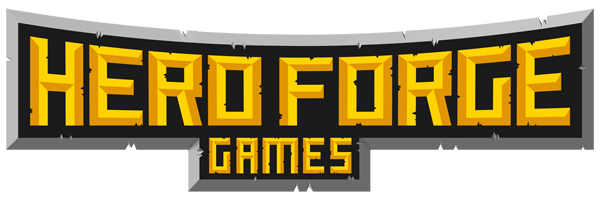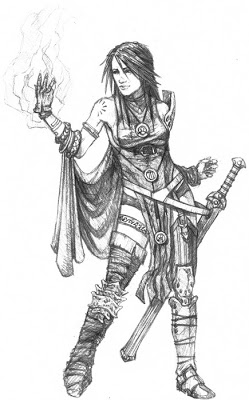Let’s get this out of the way: I strongly dislike Vancian magic.
When I started work on Heroes Against Darkness we’d just finished playing a long 4th Edition campaign followed by a shorter Basic D&D campaign. The switch from 4th Edition to Basic was caused by a general dissatisfaction with 4th Edition (don’t get me wrong, I’m not a hater) and frustration with the final module that we played (Pyramid of Shadows). The experience of playing some Basic reminded me of why I stopped playing that edition all those years ago:
• Class as race
• Spell level != character level
• Slow non-magical healing
• Clerics get no spells at 1st level, but elves get one?!?
• Arbitrary lists of armor and weapons for magic-users and clerics
• Tables (to hit), tables (saving throws), tables (thieves skills), and more tables (every damned ability score has a different one)!
Now I could whine about Basic all day, but at the time it was state of the art. Things have moved on since then, with a lot of mechanical improvements, simplification and consolidation of separate sub-systems, and better scaling for all systems.
Sadly, one of the areas where things haven’t moved on in D&D-land (at least until recently) has been the magic systems. Until 4th Edition folded martial and spell powers into the AEDU powers system (At-Will, Encounter, Daily, Utility), D&D had stuck with the same system of Vancian spell-casting, on top of which they layered various fixes to address specific and general issues (spell resistance, casting feats, spontaneous casting, various dalliances with psionics, etc).
It’s a relic of the past that should have been discarded from D&D shortly after it was introduced. It doesn’t work particularly well on an intellectual, mechanical, or gameplay level. Furthermore, it leads to the unfortunate (literal and figurative) explosion of spell-caster power as they advance in levels while the other classes are stuck with a more linear increase in power. And if you’ve read some of my earlier posts, you’ll know that Vancian spell systems are a terrible waste of pages in game rule systems (compared to the amount of space dedicated to non-magic classes), occupying up to half of the total pages in some editions’ player’s guides (AD&D 2nd Edition and Pathfinder being the notable examples of this).
So when I decided to make my own system, the major area I wanted to rework was the magic system. I began with the simple goal of implementing a magic system based on spell points (anima), and from there my goals evolved as I implemented the system and learned more and more about it in its evolution through playtesting. Eventually my goals were:
• Magi classes must be balanced against other classes
• Spells shouldn’t become redundant
• Spells shouldn’t scale without additional costs (Fireball)
• Magi enhance other classes, not replace (Knock, Invisibility)
• No magic can break the game or the GM’s narrative control (Fly, Overland Travel, Teleport, Scry)
• No spells should have absolute effects (Finger of Death, Sleep)
• Allow casters to deplete HP to cast spells (blood anima)
• Just four pages of spells for each magi class
This was going to be one post, but it’s turned into a monster so I’ll cover each of these areas in separate posts, so stay tuned!
Check out Heroes Against Darkness over at the downloads page: Heroes Against Darkness – Game Rules.


5 thoughts on “Remaking Magic”
I like what you did in HAD with magic. However, I do not consider Vancian Magic either a relic or worthy of so much derision.
Mind you, I like non-vancian systems equally well, WFRP 1e and 2e are such systems. However, I do love me some Vancian magic in BECMI, AD&D and Pathfinder. And I do harbor some dislike for 4e because of the departure.
Opposite positions indeed.
This comment has been removed by the author.
Tim, I'll cover some examples of Vancian spells in later posts, but my problem is not so much with the idea of Vancian magic systems, but in the monstrousity that is the D&D implementation, and the multitude of patches and fixes that it has required over time. And after all of that, it's still unbalanced at higher levels against martial classes.
I'm quite curious to see your solutions. I have my own reasons for disliking D&D-style magic — I don't completely hate it, but there are annoyances and problems I constantly run into with it — so new ideas are always welcome.
I will say you lost me at "No magic can break…the GM's narrative control", as the style of gaming where the GM has narrative control, or has a 'plot' or 'story' that can be messed up or broken, is a style I have come to greatly dislike over the years. (I prefer open sandboxes and player-driven narratives.)
I'm assuming your mechanical solution doesn't hinge too much on that aspect, though.
By narrative control, I don't mean the GM's ability to railroad. I'm refering to the ability of some magic spells to totally negate 'adventuring'. The example I gave was the Scry spell, which can be abused to skip to the end of adventures by high level parties.
I'm happy for parties to drive the unfolding of the narative and their goals, but I'm trying to avoid the situation where I introduce a dragon into the region, and the party immediately Scry its den (or use some other equally useful location spell), then Teleport there and dispatch the dragon.
These spells simply put all of the power in the hands of the wizards, leaving the rest of the party with very little agency. Heroes Against Darkness attempts to ensure that all classes stay relevant and engaged in the adventure, regardless of the level of play.